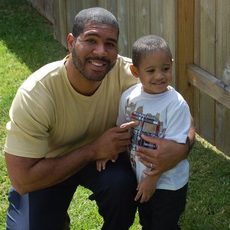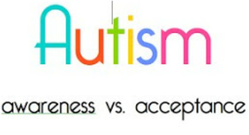 A few years ago I had someone ask me my profession. I told them I was (still am) a caregiver. The person replied with "oh, you're a babysitter" and continued on with how easy a job I had and so forth. I wanted to scream at them, I wanted to cry, then I began to rationalize, maybe I was a babysitter. I'm far more than a babysitter for a kid on mom and dad's date night, this is my career. Hats off to all the babysitters and nannies out there! We are all caregivers, brothers and sisters in arms! But, the way this person spoke was as if to devalue what we do. We are helping to shape the future of this country. Every nose we wipe and every lunch we prepare is important. Rewind five years, I'm sitting at my aunt's house and I get a call from a dad who saw my resume on a popular job board. Within an hour I'm sitting in front of the mom sharing my job experience and hours of availability. She shared about herself and her son with Autism, who I like to call "the kid." The following week the kid and I did a trial run and the rest is history. Caregiving is difficult work! At the time I started working for the kid I was already 3 years in as a Special Education/Behavior Aide. Being in a home is much different than being in a classroom. There aren't any behavior interventionists at the home. There isn't a teacher or principal. I remember the first time the kid had a meltdown. I was told to expect it but, you can never be fully prepared for a meltdown. We were walking down the street and a fire engine's siren blared! At that moment I didn't care about the emergency, I hated fire engines and their annoying sirens. The kid began to scream and throw his body. What an awesome day that was! There have been several meltdowns since that day. They've been in an aisle at Target, they've been at the park, and they've been on the streets of Highland Park while people are wondering who the kid belongs to. Then come the stares. OH MY GOODNESS the STARES! When I first started the kid was much shorter than me, I'm 5 foot 1 and he was a small 10 year old. We'd walk down the aisles holding hands; him scripting, me praying for a successful outing. People would break their necks to stare at us. It used to irritate me now, I smile and ask "may I help you?" Now that he's nearly 16 and towering over me the stares have seemed to increase. It's as if people are trying to figure out our relationship. I remember a man struggling to put his daughter in the basket because he was so busy staring at the kid jumping in our favorite section of Target (dollar spot). I was more amused than annoyed. At the end of the day it's not about the stares or the meltdowns. It's about caring for the kid. There have been times I have wanted to scream and there have been times I've had the best laughs and joys of my life with the kid. Each day I try to put myself in his shoes. Let me tell you, caregiving is hard and rewarding work! And, I'm grateful for what he's taught me. About Krysten Cooper: Krysten Cooper is an Administrative Coordinator at a day program for adults with Developmental Disabilities and a caregiver. She's been working in the disability field for over 10 years. In addition, she provides virtual administrative assistance to families of children with disabilities. She is a member of Zeta Phi Beta Sorority, Incorporated and she blogs at www.KrystenCooper.org. Krysten resides in the Los Angeles area.
0 Comments
 My son is different. He’s not what society would consider a normal child, but God created him the way that He saw fit. So that makes him perfect! With that being said, I no longer ask God to change my son. I ask Him to change the hearts and minds of many of those around him. You can’t look at my son and see that he’s different. However, as soon as he opens his mouth, you know instantly that he’s different. You see my son is nonverbal autistic, so instead of talking he sometimes communicates by making noises that many would consider strange. Often times when either my wife or I don’t pick up on what my son is trying to communicate, he gets frustrated and he’s subject to throw a fit. This seems to inconvenience many people and strange looks or comments are soon to follow. I’m reminded of a time when I took my family out to eat. While in the restaurant, my son had an episode. I tried many things to calm him down to no avail, so I eventually took my son out of the restaurant; but not before my wife overheard very rude remarks from another restaurant customer. If it’s not snide remarks, it’s strange looks that my son gets. My son is different, but he’s special, as well as other people who live with autism. It’s time that the world knows that! That’s why autism awareness initiatives are so important. We must educate people and make them aware of the challenges that many who live with autism have. We must raise our voices for those like my son, who cannot speak for themselves. We must write articles, stories, books, and blogs for those autistic boys, girls, men, and women who cannot write for themselves because of fine motor skill challenges. And we must walk and run for those, who live with autism, who can’t walk or run by themselves because we fear that they may elope. It’s not my son who needs to change, and it’s not your love ones who needs to change. Sure we do the best that we can to get them the services that they need in order for them to live a more productive life, but they shouldn’t have to change who they are in order to be accepted by society. No! It’s those intolerant individuals who feel like their lives are being inconvenienced by being in the same space with someone who lives with autism that need to change. I'm hopeful that the more we advocate and the more that we raise awareness, those hearts and minds will be changed. ABOUT THE AUTHOR George Stewart II is an educator, author, youth advocate, licensed Baptist minister, and speaker who has dedicated his life to the academic, social, emotional, and spiritual development of his family and the community at large.  I recently had the experience of being challenged to understand a variety of back to back virtual and real world social interactions. The interactions had mainly to do with bullying, mobbing, and controlling with a side of failure to communicate in which I was less a target than a witness, but I was in the position of having to respond with the timeliness of the nonautistic world. Suffice it to say, I was overwhelmed. As to be expected, I mainly felt confused, but atop this I was faced with grasping a wide range of emotional interplay. My day to day process for socially perplexing situations is to not respond until I’ve had occasion to think. (To be honest, I get stuck at freeze a lot in my default fight or flight response to confusion, so waiting until I feel less confused also seems default.) But as the passions mounted, I found myself inundated and pressed for time. This called for going into super-response mode, which for me, means researching how to talk to people under difficult emotional circumstances. I’ve used this method a while now. The Internet makes it possible to look up how people act and what society expects, so for example, it’s always made sense to me to research things like what to say – or for me, not say – to someone who loses a child. Such a question raises a huge number of hits, and so I can tell that it’s a “normal” inquiry and that everyone has trouble knowing what to say at certain times. The difference for me is not having a ready arsenal of responses to fit the occasion, specifically because I’m not always sure what the occasion is. If I can’t identify it, how can I respond to it? Today, one in 68 children in the United States is found to be affected by autism spectral disorder. Though no one has been able to determine why autism rates are rising, all experts agree that early detection of autism in a child can make a huge difference to his ability to cope with the lifelong disability disorder. As autism awareness organizations around the world get ready to celebrate the eighth World Autism Awareness Day on April 2, 2015 through online activities, local events and so on, here are some quick facts and figures about the disorder that affects nearly 1 percent of the world population. *Infographic provided by UKMobility
 Its another April and this month, you will be given a lot of information about Autism. The information you will receive will also be coming at you from many directions and view points. There will be arguments for/against vaccinations with Autism at the epicenter. Arguments will be made on whether autism is genetic or environmental. And you will be given a host of articles regarding famous people in the past and present that are or may be on the Autism spectrum. Also, many studies will be released this month for maximum exposure. Today I am going to discuss one of the newer arguments that will be happening this month: Awareness or Acceptance. Today kicks off the 2nd annual #RoyalBlueForAutismAwarenss social media campaign hosted by the Mocha Autism Network. The goal of the campaign is simple:
So why is "Awareness" given priority in this campaign over "Acceptance" when both are important? It's simple and complicated at the same time. Many people in underrepresented communities haven't Gotten to the Awareness part yet. |
AuthorWrite something about yourself. No need to be fancy, just an overview. ArchivesCategories |


 RSS Feed
RSS Feed